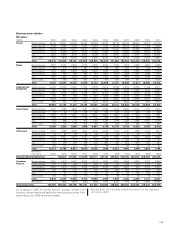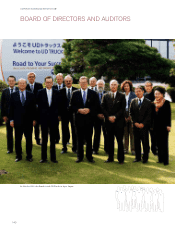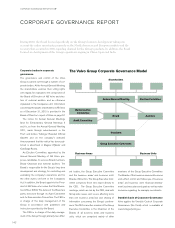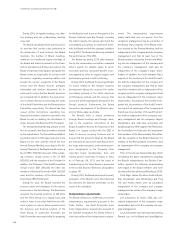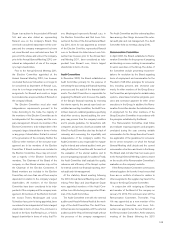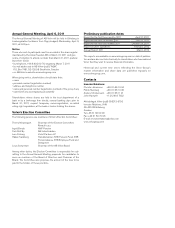Volvo 2010 Annual Report Download - page 148
Download and view the complete annual report
Please find page 148 of the 2010 Volvo annual report below. You can navigate through the pages in the report by either clicking on the pages listed below, or by using the keyword search tool below to find specific information within the annual report.
During 2010, six regular meetings, one statu-
tory meeting and one extraordinary meeting
were held.
The Board has adopted work procedures for
its activities that contain rules pertaining to
the distribution of work between the Board
members, the number of Board meetings,
matters to be handled at regular meetings of
the Board and duties incumbent on the Chair-
man. In accordance with these procedures, the
Board’s Chairman shall organize and guide the
Board’s work, be responsible for contacts with
the owners regarding ownership matters and
provide the owners’ viewpoints to the Board,
ensure that the Board receives adequate
information and decision documents for its
work and to control that the Board’s decisions
are complied with. In addition, the work proce-
dures contain directives concerning the tasks
of the Audit Committee and the Remuneration
Committee respectively. The Board has also
issued written instructions specifying how
financial information should be reported to the
Board as well as defining the distribution of
duties between the Board and the President.
The Annual General Meeting decides on the
fees to be paid to the Board members elected
by the shareholders. The Annual General Meet-
ing held on April 14, 2010 approved a fee to the
Board, for the time until the end of the next
Annual General Meeting, according to the fol-
lowing: Chairman of the Board should receive a
fee of SEK 1,500,000 and each of the remain-
ing members should receive a fee of SEK
500,000, with the exception of the President. In
addition, the Chairman of the Audit Committee
should receive SEK 250,000, the other two
members of the Audit Committee SEK 125,000
each and the members of the Remuneration
Committee SEK 75,000 each.
During the year, the Board reviewed the
business plans and strategies for the various
businesses in the Volvo Group. The Board also
reviewed the financial positions of AB Volvo
and the Volvo Group on a regular basis and
acted in order to ascertain that there are effi-
cient systems in order to follow-up and control
the business and financial position of the
Volvo Group. In connection therewith, the
Audit Committee was responsible for preparing
for the Board’s work to assure the quality of the
Group’s financial reporting through reviewing
the interim reports, the annual report and the
consolidated accounting. In connection there-
with, the Board met with the company’s auditors
during 2010. The Board continuously evaluated
the performance of the CEO.
The Board has during 2010, after prepara-
tion by the renumeration committee, evaluated
Volvo’s system for variable salary to senior
executives and has concluded that the struc-
ture applied by Volvo as regards targets and
performance periods is well functioning.
During 2010, the Board focused specifically
on issues related to the Group’s business
development taking into account the earlier
uncertainty primarily in the North American
and European markets and the recovery that
occured in 2010 regarding the demand for the
Group’s products. Furthermore, the Board
focused on development of the Group’s oper-
ation in China, Japan and India.
The Board’s work is mainly performed
through Board meetings and through meet-
ings in the respective committees of the
Board. In addition thereto, the Chairman of the
Board is in regular contact with the CEO in
order to discuss on-going business and to
ensure that the decisions taken by the Board
are executed. An account of each Board mem-
ber’s age, main education, professional experi-
ence, assignments in the Company, other
important board memberships, their and
related parties’ ownership of shares in Volvo
as of February 24, 2011, and the years of
membership on the Volvo Board, is presented
in the section Board of Directors and auditors
on page 141.
During 2010, the Board performed its yearly
evaluation of the Board’s work. The Chairman
has informed the Election Committee on the
result of the evaluation.
Independence requirements
The Board of Directors of AB Volvo must meet
independence requirements pursuant to the
Code. Further, the Audit Committee must
meet independence requirements pursuant to
the Swedish Companies Act. Below follows a
short description of the independence require-
ments. The independence requirements
mainly state that only one person from the
company’s management may be a member of
the Board, that a majority of the Board mem-
bers elected by the General Meeting shall be
independent of the company and the company
management and that at least two of the
Board members elected by the General Meet-
ing who are independent of the company and
the company’s management shall also be
independent of the company’s major share-
holders. In addition, the Code demands that a
majority of the members in the Audit Commit-
tee shall be independent of the company and
the company management and that at least
one of the members who is independent of the
company and the company management shall
also be independent of the company’s major
shareholders. According to the Swedish Com-
panies Act, the members of the Audit Commit-
tee may not be employees of the company and
that at least one member of the audit Commit-
tee shall be independent of the company, com-
pany management and the company’s largest
shareholders and shall have accounting and
auditing expertise. With regard to the Remunera-
tion Committee, the Code sets the requirement
that members of the Remuneration Committee,
with the exception of the Board Chairman if a
member of the Remuneration Committee, shall
be independent of the company and company
management.
Prior to the Annual General Meeting 2010,
considering the above requirements regarding
the Board’s independence, the Election Com-
mittee reported the following understanding
with regard to the Board members who were
elected at the Annual General Meeting in 2010:
Peter Bijur, Hanne De Mora, Anders Nyrén,
Ravi Venkatesan, Lars Westerberg and Ying
Yeh and Anders Nyrén were all considered
independent of the company and company
management as well as of the company’s major
shareholders.
Leif Johansson, as Volvo’s CEO, was con-
sidered independent of the company’s major
shareholders but not of the company and com-
pany management.
Louis Schweitzer was stated as representing
Renault s.a.s. on the Board and Jean-Baptiste
CORPORATE GOVERNANCE REPORT 2010
144



